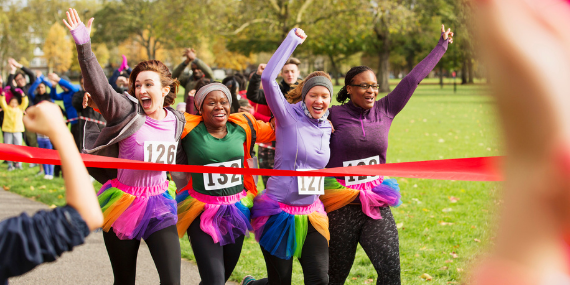All too often, we compare ourselves to others without even noticing. Diving into why comparing is natural and how it can influence how you feel is essential to taking back control of your thoughts and feelings. These effective ways to stop comparing yourself to other women will help. Also, finding out about the different ways comparison works and what to do instead is essential to conquering it.
Comparisons are a normal part of human behavior. The grass always seems to be greener on the other side. We observe others and compare ourselves to them. If we are better than they are, we feel like champions; if not, we feel depressed or stressed and want to go full throttle on being like the other person.
Many people compare themselves to others, and it will seem natural to do that. We don’t even bat an eye. It has become so routine.

Comparing and Competitiveness
Let me share an example story to help clarify: Imagine riding your bike, and suddenly someone passes you. You check out the bikers: what kind of bike they have, what clothes they wear, and their form while riding.
You might be thinking… ‘I should bike harder and keep up with them,’ or ‘I feel old and slow.’
Now reverse that idea: You’re passing someone on a run. Do you puff up your chest because you passed someone slower, and it makes you feel superior? Do you stride even stronger to show off what you can do to the slower person? Thinking if they ran (fill in the blank by using a better form, pumping the arms more, having better posture), they could be like you!
It doesn’t matter to someone else how we perform, but in our minds, often we think that we need to do better, be faster, be stronger, be leaner, and look all put-together like our friends or the person on social media. We feel we need to have that competitive edge over others.
This goes for all kinds of activities like hiking, dancing, cooking, gardening. You can name any activity and find reasons to be competitive.

In her new book, Atlas Of The Heart, Brenee Brown says: “We all compare, and it’s the death of us.” She says that comparison is not an emotion but that it drives all kinds of emotions that affect our relationships and self-worth.
To stop competing with other women, we must stop comparing.
Effective Ways to Stop Comparing Yourself to Other Women
Why do we compare ourselves to others?
Social comparison theory was first explored in 1954 by psychologist Leon Festinger and suggested that people have an innate drive to evaluate themselves often compared to others. People make all kinds of judgments about themselves, and one of the key ways we do this is through social comparison or analyzing the self with others, he writes.
Not all comparisons are bad. We get information about what we want and where we want to be, which is valuable feedback. For example, we compare our current self with our former self or others in our age group and compare our knowledge and abilities with others in our field.
Interestingly, we also tend to compare ourselves more with others at a similar level around us than those with superstar status. For example, you’ll compare yourself more to how your friends dress than Cher. All of this is natural.
We can use comparison in several different ways:

- Comparison as a Motivator
Comparison can help us establish a baseline of where we are and where we want to be. For example, if you’re running a marathon, you’ll use your friends already running as your inspiration and motivation. This way, you establish a baseline of where you are right now and compare it to your goal. This can be a great motivation.
- Comparison as feedback
Knowing you’re doing better than others can motivate you to continue doing well. Also, it can inspire you to work hard and improve yourself if you’re not. Knowing you’re on the same level as someone else might motivate you to change strategies and strive to do better.
But there is a fine line we hope not to overstep.

- The Comparison Trap
“If I was more like my friend…”
Comparing yourself to anyone else is a losing battle because you are not them! In addition, our bodies will respond differently to workouts and eating regimens, so you need to do what works best for you and learn not to compare your progress to another person.
Remember to be realistic about what you can achieve based on your body type and preferences. Find what inspires you to dive deeper into your health and fitness journey.
Check out the Fasted + Fit Over 50 Jump Start!

Self-Evaluation vs. Self-Esteem
Are you comparing yourself to others to improve yourself or feel better about yourself? Recognizing the difference between the two motivations of comparison is essential to separate healthy and unhealthy patterns. Once you know the motivation behind your comparisons, you can begin to stop comparing yourself to other women.
The Dark Side of Comparison
Here are two examples based on the same situation showing how you might react that will help determine if you are using comparison in a healthy or unhealthy way:
Imagine you’re in a running group, and you’re admiring those that are always in the front, and you want to improve your running skills so that you can run with that group. Or you may want to just get a little faster to have a better time at your next race.
You talk to some people in that group and ask for their advice on becoming a better runner. You’re happy to receive any personal advice they have or a class they recommend to help you improve your running skills. This process allows you to self-evaluate your abilities and abilities healthily.

Now imagine yourself watching the same group of runners take off. Looking at them makes you feel inferior, and you try to justify your running skills with things like you started at an older age, you’re just not that fast, you don’t care how fast you run, or they run. However, deep down, you feel low.
You start putting yourself down for not being that fast or that skinny and keep telling yourself that they act as an elite group, and you’ll NEVER compare. This comparison is unhealthy as it makes you feel unhappy, inferior, and jealous, and you perhaps talk badly about those runners. Furthermore, this comparison puts you in a hostile place not only for running, but this behavior may affect other parts of your life.
Comparing yourself for self-evaluation can be very helpful and healthy to see how we measure up to others. But comparing yourself for self– enhancement can become an obsessive and unhealthy pattern.

3 Tips To Stop Comparing Yourself
Starting to notice your thoughts around other people and your actions point you in the right direction. Remember, it’s ok to self-assess and self-reflect to reach your goals and find out where you are in the process and what you need to improve on.
- Focus on yourself
The grass is not always greener at your neighbor’s house, but instead, focus on your lawn and what it needs to flourish and stay healthy. Then, focus your self-reflection on what you already have accomplished and what steps you want to take to improve yourself.
Let’s say you want to eat healthier, and your friend always cooks excellent lasagne meals you can’t imagine making. Instead, focus on the meals you already cook well. For example, if you rock grilled chicken, add some sauteed mushrooms to make it more interesting.

- Practice gratitude
This is such a simple but overlooked habit in life. Start your gratitude practice every morning and write three things you’re grateful for. Keep it simple and write from the heart. For example, I wrote today: fresh snow, blue sky, comfortable PJs. Don’t censor your thoughts; if you have one word instead of three, that’s ok too.
You don’t have to have a fancy journal. Your phone has a note-taking app. Open up a page and start writing every day, even if it’s just one word. You’ll get better each day. Remember, baby steps.

- Stop “should-ing yourself”
How many times can you catch yourself saying: I should run longer? I should be more like my friend. I should start something new. Statements like that only focus on negative thoughts. Instead, replace them with healthier words like I can eat healthily. I want to exercise for my health. In turn, you’re creating a positive thought pattern. Of course, you’ll be catching yourself more times than not saying you should but keep practicing. I’m still working on that too.
Bonus Tip!
While “the comparison trap” mentioned earlier should be avoided, bragging about your accomplishments is okay. I don’t even want to call it bragging, but recognizing your strengths, talents, and achievements is essential to avoid the comparison trap. Furthermore, it’s one of the most effective ways to stop comparing yourself to other women.
Try writing down three things you REALLY like about yourself – something that identifies a strength. For example, don’t just write, “I’m a great runner,” but make them personal.

Here are three of mine:
- I’m positive. Not everything is going according to plan; whether it’s not finding time to exercise or getting injured during a run, I’m always finding the best solutions to overcome those roadblocks by taking action.
- I’m a people person. I get energy from interacting with people, whether online or in person. I use this energy to encourage and empower my community by encouraging them to do what they’ve dreamed of and reassuring them that we’ll find a way to make it happen. Yes, you can!
- I’m an amazing fitness and nutrition coach. If I weren’t doing that for a living, I would be a travel consultant teaching people how to exercise and eat well while traveling and enjoying the local cuisine.

If you are struggling with unhealthy comparisons, I advise you to follow the steps above, which are effective ways to stop comparing yourself to other women. Don’t let the thought of others’ expectations influence your self-esteem, which will create self-doubt. Instead, evaluate your choice for where you are as an empty nester mom. If it is, then don’t give it another thought.
This is so good!!! It is human nature to compare ourselves, and I find myself doing it often. But I love the idea of practicing gratitude and have been trying to do that more.
XOOX
Jodie
http://www.jtouchofstyle.com
It’s so ingrained into our culture for sure but we can notice and then check why we are comparing.
What a great blog post Heike!
We all know that “comparisonitis” can hold you back from achieving your goals, however I really like how you explained that comparison can also be a positive thing that spurs us on to keep improving.
There are always 2 sides to a coin 🙂 for sure. Thanks for stopping by Cat.
Great post! I love this part:
To stop competing with other women, we must stop comparing.
I always go for Community over Competition. That’s definitely the way to go rather than be super competitive with other women.
Adrian, I couldn’t agree with you more. Thanks for stopping by.
Hi Heike
This was very interesting to read. I always like to know or wonder about where things originated.
I think I try to compare things within myself, ie.. a year of jogging and how my endurance and strength has improved.. It really can be detrimental to compare to others – if done frequently. I love your tips! I know the shoulda, coulda, woulda’s don’t help!
jess xx
http://www.elegantlydressedandstylish.com
Jess,
Measuring progress can be so helpful for sure, and we know if something works or not! Let’s not have those should’s infiltrate our lives.
You offered great advice. It’s often we are hardest on ourselves. We should try to be kinder and appreciate who we are.
Thank you, Nancy. So much to learn about ourselves.
Comments are closed.